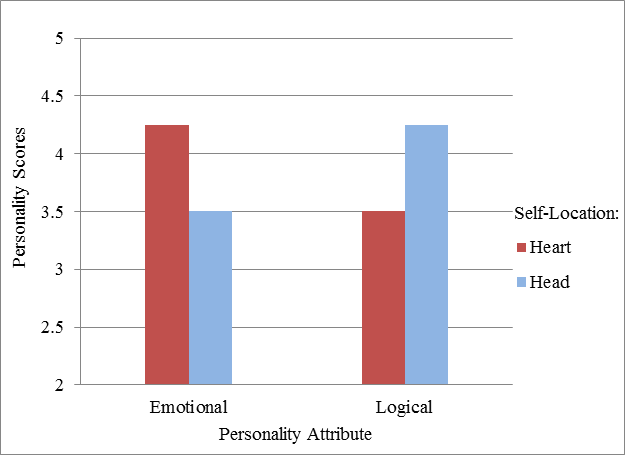What can metaphors tell us about personality?
 Figure 3. Idealized Emotional and Logical Personality Scores for Heart versus Head Locators.Of perhaps more importance were the personality-related findings. Heart-locators scored higher on measures of emotionality and interpersonal
warmth. Head-locators described themselves as more logical, but they also scored higher in interpersonal coldness and were less agreeable. These results are quite consistent with metaphors for the heart (e.g., it is emotional) versus the head (e.g., it is logical). It was also found that heart-locators preferred relying on intuition, whereas head-locators preferred relying on rational thought, when making decisions. Other studies established that head-locators had higher GPAs and answered general knowledge questions more accurately and that heart-locators were more likely to solve moral dilemmas in an emotional manner. Figure 3 presents idealized data of the type found in the Fetterman and Robinson (in press) paper.
Figure 3. Idealized Emotional and Logical Personality Scores for Heart versus Head Locators.Of perhaps more importance were the personality-related findings. Heart-locators scored higher on measures of emotionality and interpersonal
warmth. Head-locators described themselves as more logical, but they also scored higher in interpersonal coldness and were less agreeable. These results are quite consistent with metaphors for the heart (e.g., it is emotional) versus the head (e.g., it is logical). It was also found that heart-locators preferred relying on intuition, whereas head-locators preferred relying on rational thought, when making decisions. Other studies established that head-locators had higher GPAs and answered general knowledge questions more accurately and that heart-locators were more likely to solve moral dilemmas in an emotional manner. Figure 3 presents idealized data of the type found in the Fetterman and Robinson (in press) paper.
One further study extended this analysis to daily patterns of emotion and behavior. Consistent with the idea that heart-locators are more emotional, they (relative to head-locators) reacted to stressful events with more intense negative emotions. Consistent with the idea that head-locators are more interpersonally hostile, they (relative to heart-locators) reacted to daily provocations with greater aggressive behavior (e.g., arguing and yelling). Additional analyses indicated that the head-heart measure was unique in its ability to account for the diversity of findings obtained across studies (Fetterman & Robinson, in press).
In sum, people solve the problem of representing the self by thinking about it in metaphoric terms – i.e., as a head-related or heart-related being. When they locate the self in the head (heart), the self becomes invested with attributes metaphorically linked to it such as greater rationality (emotionality). Although it is quite likely that a smart person will gravitate toward thinking that the self is in the head and a nice, emotional person will gravitate toward thinking of the self as in the heart, we also suggest that self-locations reinforce such differences between people. Additional studies are investigating other correlates of self-location such as empathy, the quality of personal relationships, and scholastic performance across time.
Is metaphoric thinking functional?
People presumably use metaphors because they help one to understand non-tangible concepts such as the self or its emotions (Lakoff & Johnson, 1999). An individual differences approach might be particularly useful in examining this idea. Specifically, it is almost certainly the case that people differ in the extent to which they use metaphors in their daily lives. If metaphoric thinking is functional, then people who use metaphors more often should be advantaged relative to their non-metaphorical counterparts. This direction of research was the focus of the first author’s dissertation. As an initial step, a 30-item metaphor use questionnaire was created. People had to choose a literal phrase (e.g., “she makes rational decisions”) or a corresponding metaphoric phrase (e.g., “she uses her head”) as one that the self would typically speak, write, or think. Responses to the questionnaire were quite reliable and people differed substantially along this metaphor use dimension.
To assess whether (greater) metaphor use is functional, two additional studies focused on potential relations with emotional intelligence. The rationale for this focus is that emotions are non-verbal, non-physical entities and metaphors are thought to help people understand them (Crawford, 2009; Meier & Robinson, 2005). Consistent with this idea, metaphor users scored higher on scenario-based measures of emotional intelligence (e.g., one requiring them to determine which two emotions would most likely co-occur in a particular situation). They were also less disrupted by the negative events of their daily lives. Although more work remains to be done, these results point to the functionality of metaphoric thought in the important domain of emotions. Armed with a well-performing metaphor use scale, the benefits and potential costs of metaphoric thinking can be more fully evaluated in future studies.


